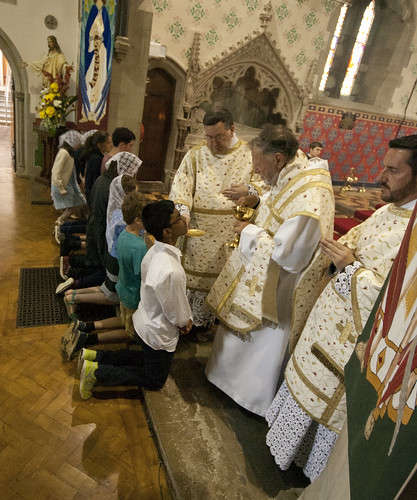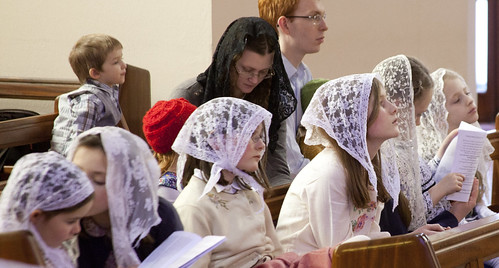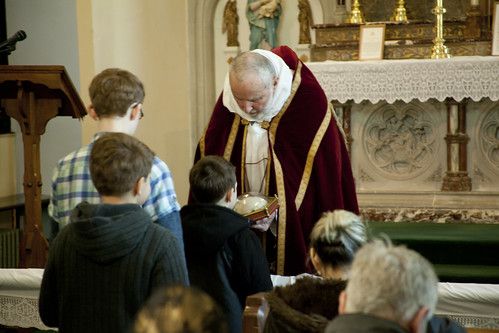 |
| At the St Catherine's Trust Summer School |
I have written on this blog about how the 1974 Directory on Children explicitly promoted the idea that children should be introduced to the liturgy through 'human values', and expected them to 'open their eyes' to the supernatural nature of the liturgy only at a later stage. I think this idea is the source of a large proportion of the confusion and mistakes which are found in the debate today. It seemed to me to parallel Maria Montissori's argument that young children are not ready for fairy stories, because they cannot distinguish fantasy and reality. It is also related to the idea we find in the Liturgical Movement, that 'understanding' is necessary to participation in the liturgy. If 'understanding' is a matter of being able to articulate the message being conveyed, then this is a argument for a drastic simplification of the liturgy, a simplification which must go even further when the liturgy is being offered to the 'simple', and to children. This is exactly the pattern we see in progressive liturgical talk, so I think this must be what they are thinking, or something like it. The poor and uneducated cannot understand complicated theology, give them something simple, they say.
Now this of course is a terrible mistake. To see it is a mistake, just think of wordless prayer: the kind of prayer used by the Church's saints and mystics, to which we are all encouraged to aspire. (The Catechism of the Catholic Church has a magnificent section on prayer which says a lot about this.) A person who engages in wordless prayer, is he able to articulate, to put into words, the propositional meaning for his experience? Of course not. Does that mean that he failed to participate in this practice, or failed to communicate? Far from it.
The same point can be made in relation to the appreciation of art. Do you need to be able to articulate, put into words, what you gained from an encounter with a great work of art, for it to count as a meaningful experience? Don't be daft.
A different brand of progressive in the Christian world is very against propositional, intellectual, linear, logical, theology. Quakers, for example, don't do a great deal of logic-chopping in their theological reflections, and have wordless, silent worship to go with it. The Catholic tradition combines mysticism with intellectual rigour - quite an achievement, when you think about it. It is the liberal achievement to destroy both at the same time, which is equally impressive, though in a different way...
Anyway, once we free ourselves of the unfortunate idea that people don't get anything out of an experience when they can't write down it's meaning in a series of propositions, then we can think about a whole lot of things in a more sensible way. The relationship a parent can have, for example, with a Down's Syndrome child. The wordless companionship of those in love. The social experience of interactive sports. The world really is an interesting place, if you don't limit communication to words, and meaningful experiences to things which can without remainder be put into words: we all know this, if we don't let liturgical maniacs befuddle us.
Accordingly, there is no reason to assume that small children don't get something out of the liturgy, and it is misleading to say that they do not understand it. Understanding a complex experience is a matter of degree, and small children understand things at their own level, in their own way, and gradually come to understand more, if they keep on having similar experiences. That's how they learn. It no more makes sense to say 'they shouldn't be at Mass (or: the normal Mass) because they don't understand', than it makes sense to say that they shouldn't be exposed to adults talking to each other, or paintings, or school work, or loving relationships. How are they ever going to understand it, if they are not exposed to it?
To take this to a deeper level, I want to note three categories of experience children have.
The first is in relation to things that particularly appeal to them. Children can pay very close attention to stories, and on occasion remember them in great detail. They can be fascinated by farm or wild animals. And of course they can be completely absorbed in play. These examples show children's considerable capacity for concentration. Perhaps this doesn't happen to children whose brains are addled with TV, but for non-pathological youngsters it does.
The second is with things which might be said to be 'over their heads'. If you take small children to an art gallery, or let them play in the same room where adults are talking, or expose them to any number of things which are, in an obvious way, over their heads, what you find is this. They will do their own thing - look at their books, draw, play with dolls or whatever - and attend to the art, or the conversation, or whatever adult thing is at issue sporadically. From time to time they may catch sight of or hear something which engages them, and ask a question, or just pay attention to it. This can on occasion take the form of prolonged concentration. You may find out days or weeks later that a child has been thinking intensely about some remark he heard in an adult conversation, and it may have been the subject of discussion in a group of children. The child may stop in the art gallery and stare at a particular picture for a long time. It may put in an appearance in his dreams.
 |
| At the St Catherine's Trust Family Retreat |
The third category of experience works in a slightly different way: relationships. Children don't learn about love and friendship, anger, resentment, forgiveness, rivalry and cooperation, by taking notes from a blackboard. These are things which are not necessarily articulated at any point in one's life; a fully functioning adult, with sensitivity and good social skills, cannot put his wisdom fully into words, because that would be impossible, and greater 'emotional intelligence' doesn't necessarily imply a greater than average ability to articulate it. This is an understanding which is learnt from experience and example, experiences and examples which do not (primarily) convey propositions, but enter into a child, and effect his character. You can see children, and adults too, becoming more sensitive and more generous, or harder, more pinched and selfish, as time goes on. You can see it in their behaviour, and in their faces. It's not, primarily, a matter of their accumulating knowledge, it is matter of character formation.
Again, my point is that this is normal, and that this is an immensely important aspect of education--for want of a better word--which has nothing to do with formal education.
What I want to suggest is that while the liturgy is not normally like the first kind of experience, it is a bit like the second--engagement with things 'over their heads'--and a bit like the third--a child's education in relationships--and indeed these two kinds of experience are not completely different from each other. A child's liturgical experience is at once a matter of sporadic attention to what is grown up, but also something which has an emotional and spiritual impact on the child's developing character. The little things which a small child may happen to notice in Mass--a bit of chant, a beautiful vestment, the Infant Jesus in the crib--may not only be the subject of intense interest, but in small ways formative influences. As a child's attention to the liturgy becomes less sporadic, he will find that what he is now paying closer attention to is something with which he is already thoroughly familiar, as is the case with adult conversation or the pictures on the walls of his own home. This familiarity is a school of prayer, just as the emotional life of the family is a school of relationships.
The children of Catholics attached to the Traditional Mass are not preternaturally disinclined to run (or crawl) up and down, bang toys on pews, and pull each other's hair. They don't pay attention to everything the priest says and does from the moment of their baptism. They gain a useful training in being quiet and respectful, of course, by attending Mass with their parents. But the fundamental thing is that they gain a familiarity with the most beautiful and profound spiritual things, in a context of reverence of course, and not only does this lend itself to a growing understanding, in every sense, of what is going on, but it affects the development of their personalities. Liturgical hierarchy, order, and worship; the reality of holy things, and how they can be handled; the ordering of joy and grief and penance and praise into the prayer of Christ in the Church: these things can't be taught from a book, and they can't be picked up in a few weeks. They must gradually take form inside a receptive soul exposed to the liturgy over years and decades.
Like almost every Catholic of my generation, I was deprived of our great liturgical patrimony as a child. Even so, my early experiences of the liturgy had an effect on me, and not all bad. As well as some ghastly things, I have deep and moving memories of Midnight Masses, early morning Masses, monastic Vespers, the singing of the Ave Regina Caelorum: these stray things stayed with me and nourished my imagination and soul. What a privilege it is, now, to be able to take my own children to Mass. Without deprecating liturgical catechesis, discussing the readings and all that, the main message must be: Just let them soak it up.
And for heaven's sake don't take them away from grown-up worship in order to give them something 'easier to understand'.
Anniversary Supporter'.

Having seen examples of Childrens' Liturgy when they leave Mass to do other things I begin to wonder how children brought up in this atmosphere will ever know the Faith. Perhaps they think that adults do something equally inane in the church while they are out painting pictures etc. In my childhood we learned about the Mass by being present with a parent & using a child's missal which clearly explained what was happening on the altar. We also, even at Infant School, learned of the Mass & what it was. How can children be expected to know about the Real Presence if they aren't instructed - &, from what I've seen, this doesn't happen in thei socalled liturgy.
ReplyDeleteThis article is spot on. Until my son was seven we attended a "child centred" Mass as this was a condition of his making his First Communion. Afterwards we stumbled upon a beautiful neo-classical church with a traditional choir. At the end of this Mass my son, entirely unprompted, asked that we never go back to the other Mass. When asked why he replied "because the music and the building are so beautiful". Despite being a very ordinary seven year old, he instinctively responded to a reverent and meaningful liturgy and went on to serve in the church, until driven out by the advent of guitars and youth Masses at 16, when he decided "if the Mass can be reduced to this, then there can't be much there".
ReplyDeleteThis article is spot on. Until my son was seven we attended a "child centred" Mass as this was a condition of his making his First Communion. Afterwards we stumbled upon a beautiful neo-classical church with a traditional choir. At the end of this Mass my son, entirely unprompted, asked that we never go back to the other Mass. When asked why he replied "because the music and the building are so beautiful". Despite being a very ordinary seven year old, he instinctively responded to a reverent and meaningful liturgy and went on to serve in the church, until driven out by the advent of guitars and youth Masses at 16, when he decided "if the Mass can be reduced to this, then there can't be much there".
ReplyDelete